1 August 2023
Kieran Doherty TD – Died on 2 August 1981 after 73 days on hunger strike in the H-Blocks of Long Kesh

KIERAN DOHERTY, aged 25, was born in Andersonstown, west Belfast, on 16 October 1955.
Kieran was a teenage internee between February 1973 and November 1975. On his release he was an extremely active IRA Volunteer and was finally captured in August 1976. Kieran received an 18-year sentence in January 1978 for possession of weapons.
On 11 June 1981, Kieran was elected as TD for the Cavan/Monaghan constituency in the Dáil general election, receiving over 9,000 first-preference votes.
He spent 73 days on hunger strike from 22 May. He died on 2 August 1981.
• • • • • • • • • • • • • • • • • • • • • • • • •
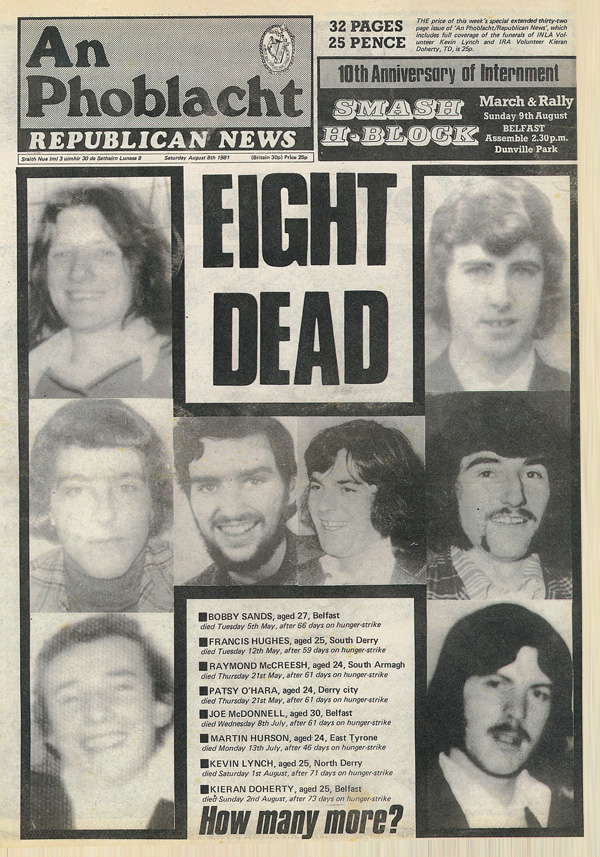
Big Doc’s final journey
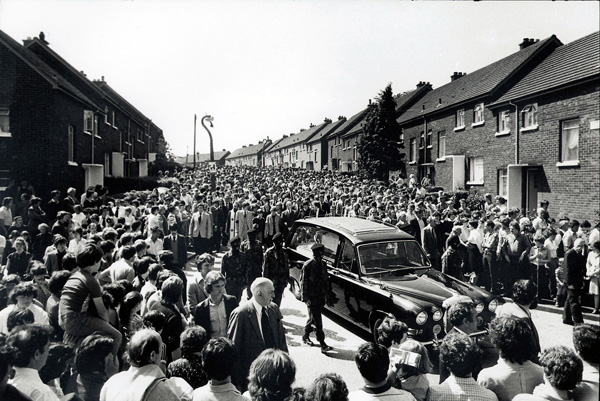
• The funeral of Kieran Doherty TD passes through west Belfast
IRA Volunteer Kieran Doherty, TD for Cavan/Monaghan, died at 7:15pm on Sunday 2 August 1981, the day after Kevin Lynch’s death. Kieran had joined the hunger strike one day before Kevin Lynch and survived one day longer.
Kieran Doherty embarked on his fast upon the death of Raymond McCreesh. He managed, with difficulty, to speak to his family almost to the end though his sight had almost completely gone. Kieran (or ‘Big Doc’ as his comrades affectionately called him) had a strong spirit of survival which kept him conscious for most of his 73 days on hunger strike.
Kieran’s body was brought out of Long Kesh and through Andersonstown to his parents’ home in Commedagh Drive at two o’clock in the morning. About a thousand mourners accompanied the coffin and even larger crowds came out on Monday morning to pay their respects. The next day, hundreds of stewards took position on the funeral route as Kieran’s coffin was carried out of his parents’ house, escorted by an IRA guard of honour. An IRA firing party came out of the crowd and, lining the side of the coffin, fired a volley of shots. As British Army helicopters hovered overhead, the crowd cheered at the Brits’ inability to prevent the firing party from honouring their dead comrade.
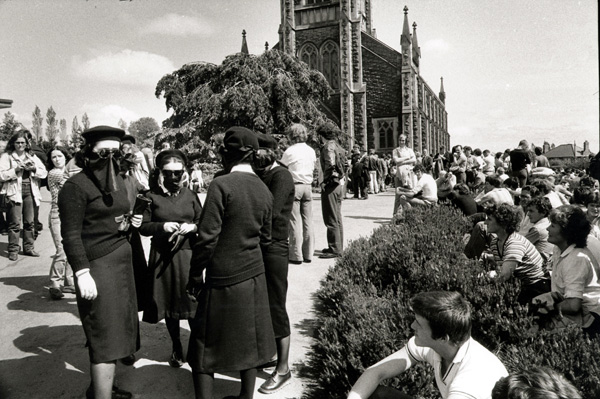
• Scene during the funeral Mass at St Theresa’s Church; (below) Kieran Doherty’s coffin is carried by his sister Mairéad (left) a family friend Siobhán McKenna (centre) and sister-in-law Betty Doherty (right)
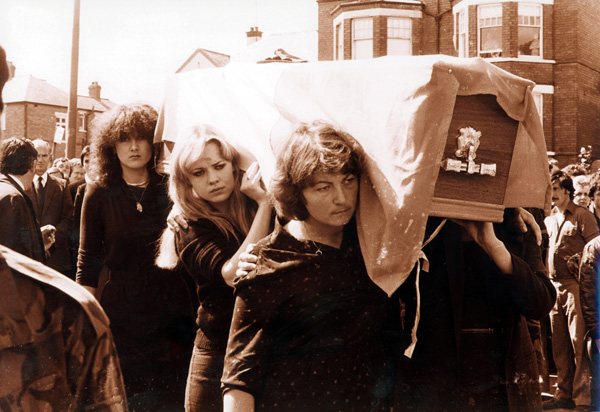
The cortege then moved through Andersonstown, led by two pipers. It may be recalled that during the Hunger Strike some of the clergy had set out to undermine the prisoners’ protest. In contrast to the attitude of the priest celebrating Mass at Kevin Lynch’s funeral, Fr Hansen’s sermon demonstrated a fundamental understanding of the issues at the core of the Hunger Strikers’ protest. While the presiding priest at the Lynch funeral refused to wear his vestments at the graveside because of the presence of a firing party, the priest at Kieran’s funeral recalled having visited Doherty on the 13th day of his fast and remembered it to be a cheerful event. He went on to recount Kieran’s words when he asked him if he would consider coming off the hunger strike. Kieran replied:
“Look, Father, I could not give up. If I did I would go back to criminal status. I am not a criminal. I never was and never will be one.”
Recalling those words at the funeral of Kieran Doherty, the priest said:
“Basically, I had to agree with him.”
He finished off by saying:
“Kieran was very much his own man. He died quietly and very determined, serene and dignified.”
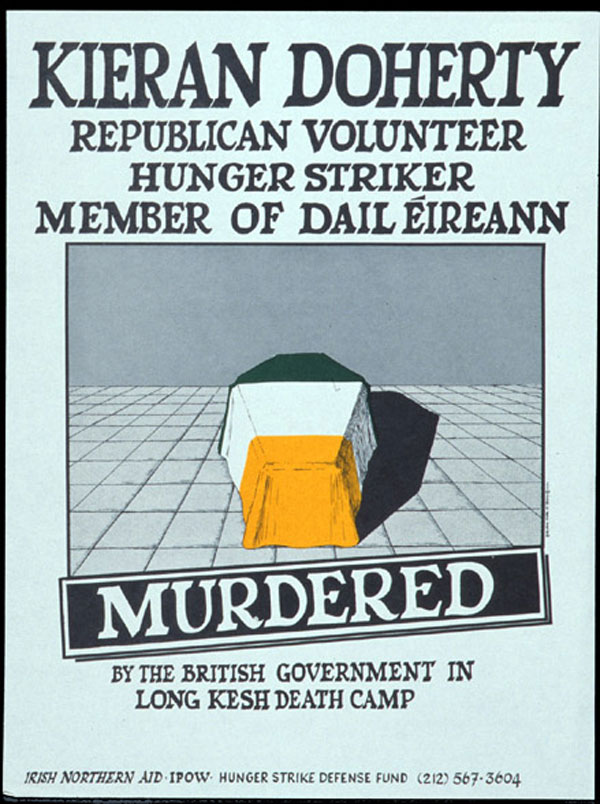
Fr Toner, who was criticised by Bobby Sands in his diary, was in the congregation, listening but apparently unmoved by Fr Hansen’s words.
It was estimated that a crowd of about 20,000 attended Kieran’s funeral.
Chairing the event, Sinn Féin member Jimmy Drumm referred to the ongoing pursuit of the prisoners’ ‘Five Demands’.
“The British Government needs to be moved on the issues of work, association and segregation.” He finished by saying that with the basis of a just settlement “then we and the families will be spared the anguish and suffering of such funerals as this, and the prisoners who have suffered so much will be able to live in tolerable conditions.” Kieran Doherty was the eighth man to die on hunger strike in 1981 and two more would follow.
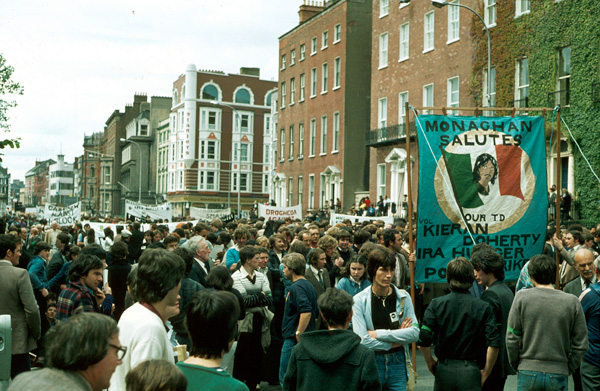
The oration at Volunteer Doherty’s funeral was given by Caoimhghín Ó Caoláin, Kieran’s Director of Elections during the 1981 general election in the 26 Counties.
Ó Caoláin said that the people of Cavan/Monaghan had taken the 26-year-old to their hearts and that they were proud to elect him as their public representative. Ó Caoláin criticised the Irish Government’s handling of the Hunger Strike, saying:
“Their gamesmanship for petty political scores has been a major factor in the continuing deaths in Long Kesh. The people of Cavan/Monaghan hold the present coalition government directly responsible, through firstly their inactivity and afterwards their open support for pressure to be placed on the Hunger Strikers and their families.”
Ó Caoláin recalled all the other Irish hunger strikers who had died as a result of British intransigence, three of them elected representatives: Terence MacSwiney, Bobby Sands and Kieran Doherty. Again of Doherty, he added that Kieran had taken his place amongst all those who fought for the three tenets of republicanism: “Equality, as embodied by James Connolly, who struggled to achieve a classless society; liberty, the liberty of Patrick Pearse; and the fraternity of Wolfe Tone.”
Follow us on Facebook
An Phoblacht on Twitter
Uncomfortable Conversations

An initiative for dialogue
for reconciliation
— — — — — — —
Contributions from key figures in the churches, academia and wider civic society as well as senior republican figures





